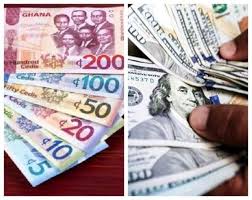The Ghana cedi, which only a few months ago was hailed as one of the best-performing currencies globally, is now under significant strain as analysts project further depreciation in September 2025.
Currently trading at GH¢11.96 to the US dollar on the interbank market and GH¢13.00 at the forex bureaus, the cedi is grappling with tight foreign exchange (FX) supply and elevated corporate demand.
In August, the local currency depreciated sharply to GH¢11.70 to the dollar, reflecting a severe liquidity crunch in the forex market. This reversal followed a strong performance in the first half of the year when the cedi posted a remarkable 50% gain, bolstered by high bullion prices. However, as the market continues to correct, the outlook for September remains grim.
Most analysts are projecting that the cedi could weaken further on the interbank market to about GH¢12.20 to the US dollar by the end of September. Research outfit IC Securities, in its recent update, noted: “We expect further interbank weakness toward our fair value of GH¢12.2/US dollar ±0.5 as market correction continues amid tight FX supply and elevated FX demand.”
This forecast highlights the severity of pressures mounting on the local unit. Bloomberg also reported on September 4, 2025, that the cedi had weakened by 13% in the third quarter alone, effectively erasing a portion of the gains that placed it among the world’s best-performing currencies earlier in the year.
Demand-Supply
The demand for dollars has intensified as corporate entities rush to settle import bills ahead of the festive season, further stretching the limited FX reserves available. This heightened corporate demand, combined with relatively low inflows, has tilted the balance against the cedi.
Additionally, the Bank of Ghana’s (BoG) policy curbing foreign currency cash withdrawals not backed by equivalent foreign currency deposits has had an unintended ripple effect on the retail forex market. The move, designed to tighten regulation and stem speculative trading, instead amplified losses in the retail segment, driving the dollar up to GH¢13.00 at forex bureaus.
The shifting sentiment in Ghana’s forex market has not gone unnoticed. International investors who initially flocked to the cedi during its bullish run are now adopting a more cautious stance. While Ghana’s year-to-date gain remains positive at 20.35% as of September 5, 2025, market watchers argue that this cushion is rapidly eroding in the face of mounting depreciation.
Bloomberg’s assessment that the cedi’s sharp fall in Q3 marks one of the biggest currency declines globally underscores the fragile confidence in the local currency. Investors are keenly watching whether the BoG will intervene more aggressively to stabilize the market or continue to allow a gradual correction.
The central bank faces a delicate balancing act. On one hand, aggressive interventions such as increased dollar injections could provide temporary relief but may also deplete reserves too quickly. On the other hand, allowing the currency to find its “fair value” could cause short-term pain for businesses and consumers but may restore equilibrium in the long run.
BoG officials have so far maintained that the situation remains under control, citing the resilience of Ghana’s broader macroeconomic fundamentals. However, market realities suggest that the policy direction in the coming weeks will be pivotal in determining how deep the cedi’s slide goes.
Implications
For businesses, particularly import-dependent firms, the weakening cedi means higher operational costs and potential price hikes for goods and services. Small and medium-sized enterprises (SMEs), already grappling with inflationary pressures, face even tighter margins as they attempt to adjust to the currency’s depreciation.
Consumers, too, will feel the pinch as prices of imported goods—from fuel to electronics—continue to climb. Analysts warn that unless the cedi stabilizes soon, inflationary pressures could worsen, undermining recent gains in economic stability.
The outlook for the cedi remains clouded with uncertainty. Analysts broadly agree that September will be a tough month for Ghana’s local currency, with depreciation expected to persist as corporate demand outpaces available supply.


Comments are closed.